In February 2024, new passenger vehicle registrations in Europe (EU, EFTA, UK) increased by 10% with sales increasing mostly for petrol cars.
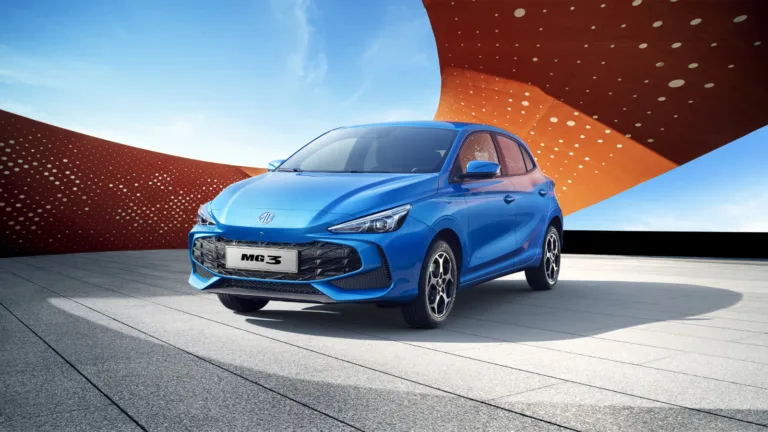
New car sales in the European market increased by a tenth in February 2024. The major growth sector was for petrol-engined vehicles with sales of diesels lower and the market share of battery-electric vehicles flat. Volkswagen remained the largest car brand in Europe in February 2024 despite lower volume sales. The Dacia Sandero was again the top-selling car model in Europe while the Tesla Model Y was Europe’s favorite electric car.
Latest European Car Market Statistics 2024 (Full Year): Market Analysis, Sales by Country, Electric, Brands, Top 50 Models, Top 20 Electric Models; 2023-2007.
New Car Market in Europe in 2024 (February)
In February 2024, a total of 988,116 passenger cars were registered in 28 European markets (EU, UK, EFTA) according to JATO Dynamics. The market thus expanded by 10% (almost 90,000 vehicles) compared with February 2023.
Year-to-date 2024, the European new car market grew by 11% to nearly two million vehicles. Felipe Munoz, Global Analyst at JATO Dynamics, commented: “As the economic outlook has continued to improve, the car market has gone from strength to strength. This comes despite the ongoing geopolitical tensions across the continent.”
Battery Electric Vehicles (BEVs) were not driving growth in car sales in Europe, as they have done in recent months. The market share of electric vehicles was flat at 13.2% of all new car sales in Europe.
In contrast, gasoline cars performed almost as well as before the Covid-19 pandemic. JATO’s data revealed that these vehicles were responsible for 61% of total registrations in February 2024, in comparison to the 62% registered in February 2019. This success comes at the expense of diesel cars, with the market share of these vehicles falling from 35% of registrations in February 2019 to just 15% last month.
Munoz, added: “Despite the noticeable shift towards EVs, many European consumers are not ready to turn away from ICE cars. While we’re seeing a clear decline in demand for diesel models, drivers are opting for gasoline alternatives, rather than switching to electric.”
Although the unexpected end of subsidies for electric cars in Germany at the end of 2023 placed a damper on the market, sales were not encouraged by continued high prices. Promises of cheaper electric cars from major manufacturers have not yet resulted in volume cars being market-ready, or likely to be available for another two years or more. The development of charging infrastructure also remains woefully below promises.
Increased Sales in Europe of Cars Produced in China
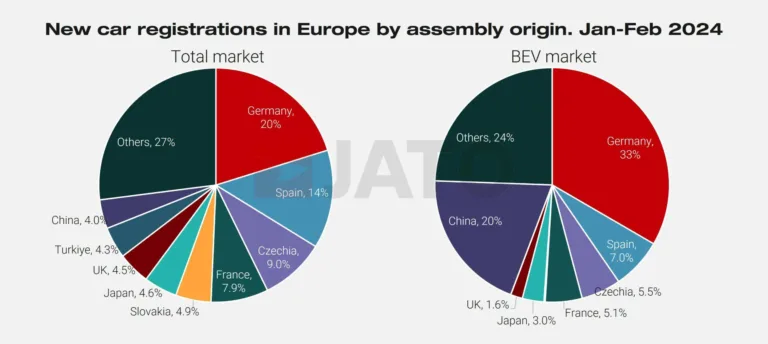
Although the actual volumes remained low, JATO highlighted the strong percentage increase in cars produced in China that were sold in Europe thus far in 2024. It should also be noted that many of these cars were produced for European-owned or oriented carmakers. Electric cars are increasingly arriving from China.
In Europe, registrations of cars made in China saw the highest levels of year-on-year growth in February (+45%) and in January and February 2024 (+43%). By comparison, the registrations of cars made in Germany and Spain -– the second and third most popular origins -– saw increases of 6% each during February. The market share of Chinese-produced cars in Europe reached a new high of 4.0%, up from 3.0% in February 2023. As a result, cars made in China outsold cars made in Italy, Korea, Morocco, and Romania, while also closing the gap between cars made in Turkey and the UK.
This growth is even stronger for battery-electric vehicles with one in five electric cars sold in Europe in February and year-to-date 2024 produced in China. In contrast, registrations of BEVs made in Germany increased by just 8% in the first two months of 2024. The volume of plug-in hybrid cars made in China fell by 62% in February 2024, with these vehicles making up just 3.4% of the total coming from China, compared to 66% for BEVs.
Munoz, continued: “The growth is partly explained by action taken by some Chinese OEMs to accelerate imports ahead of the EU decision on the anti-subsidy investigation. Increased tariffs could slow the growth of China’s OEMs, but as a knock-on effect it could also prompt them to accelerate their deliveries to Europe.”
While these results are impressive, it is notable that approximately 44% of all the volumes of made-in-China cars were registered by Western brands including Tesla, Volvo, and Dacia. A further 40% were registered by MG – fully Chinese-owned and designed, but positioned as a UK brand in the West. This means that Chinese brands accounted for just 16% of Chinese-made car registrations, reinforcing the fact that these manufacturers continue to face challenges related to perception and awareness in Europe.
Munoz, added: “Chinese brands still have a long way to go before they occupy a significant part of the European market. Despite the strides they have made in regard to performance and affordability, increasing awareness and shifting long-standing perceptions will take time.”
Top-Selling Car Brands in Europe in February 2024
The best-selling car marques in Europe in February 2024 according to JATO were:
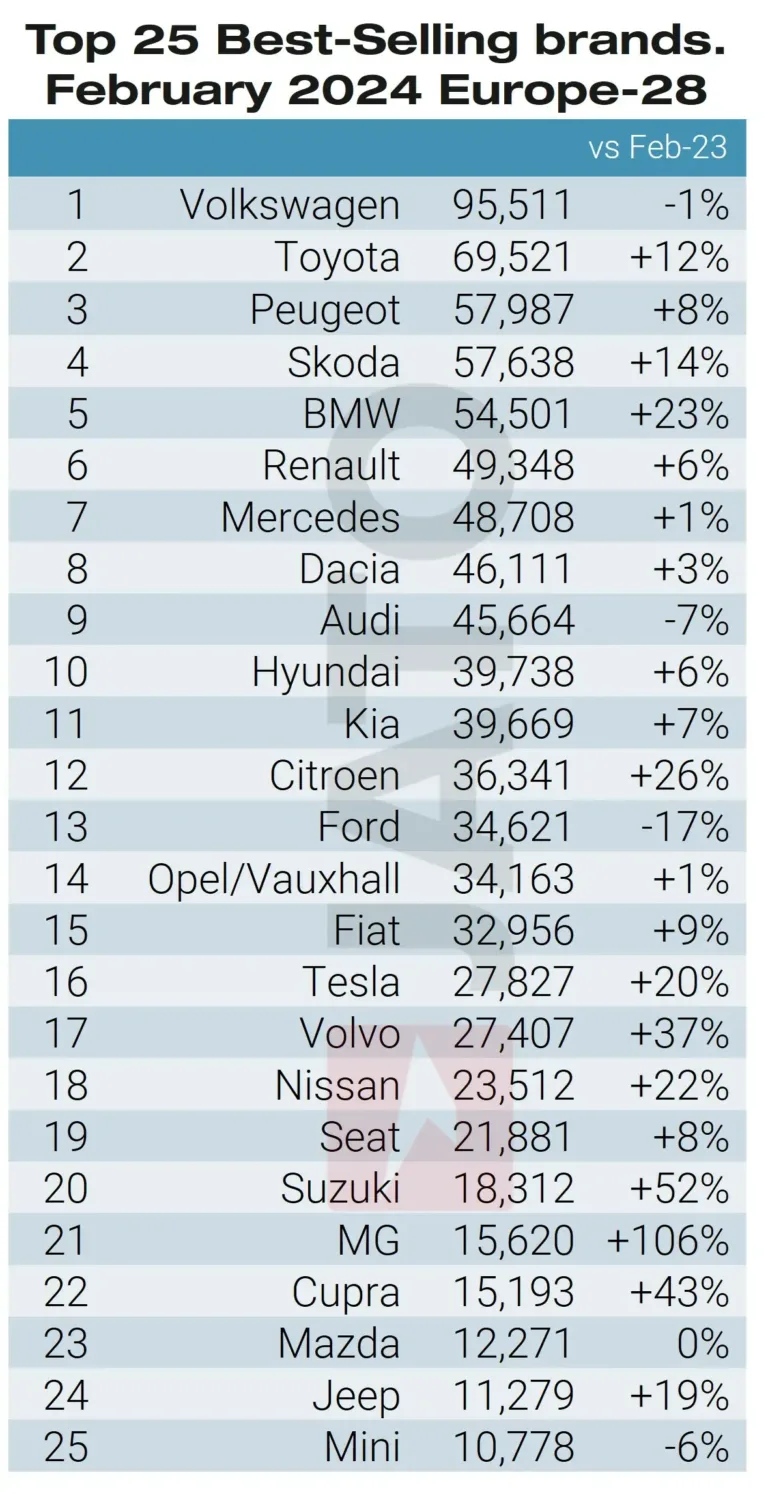
Volkswagen remained the largest car brand in Europe in February 2024 despite a decline in car sales. Toyota and Skoda narrowly beat the broader market while BMW sales were up by nearly a quarter.
SAIC, the parent company of MG and Maxus, more than doubled car sales in Europe in February 2024 to become the 21st largest car brand. Due to the popularity of its combustion engine models, it secured the highest market share increase of any OEM in February. Despite the strong performance of its electric models (the MG 4 was the fourth most-registered electric car in February), gasoline models were the main driver of growth for the manufacturer. As a result, MG registered more new cars than Cupra, Mazda, or Jeep during the month.
Other brands with strong growth in car sales in Europe in February 2024 included Suzuki, BMW Group, Mitsubishi, and Toyota. In contrast, Volkswagen Group, Ford, Renault Group, Mercedes, and Hyundai-Kia posted the biggest losses in market share.
Best-Selling Car Models in Europe in 2024 (February)
The 25 top-selling car models in Europe in February 2024 according to JATO were:
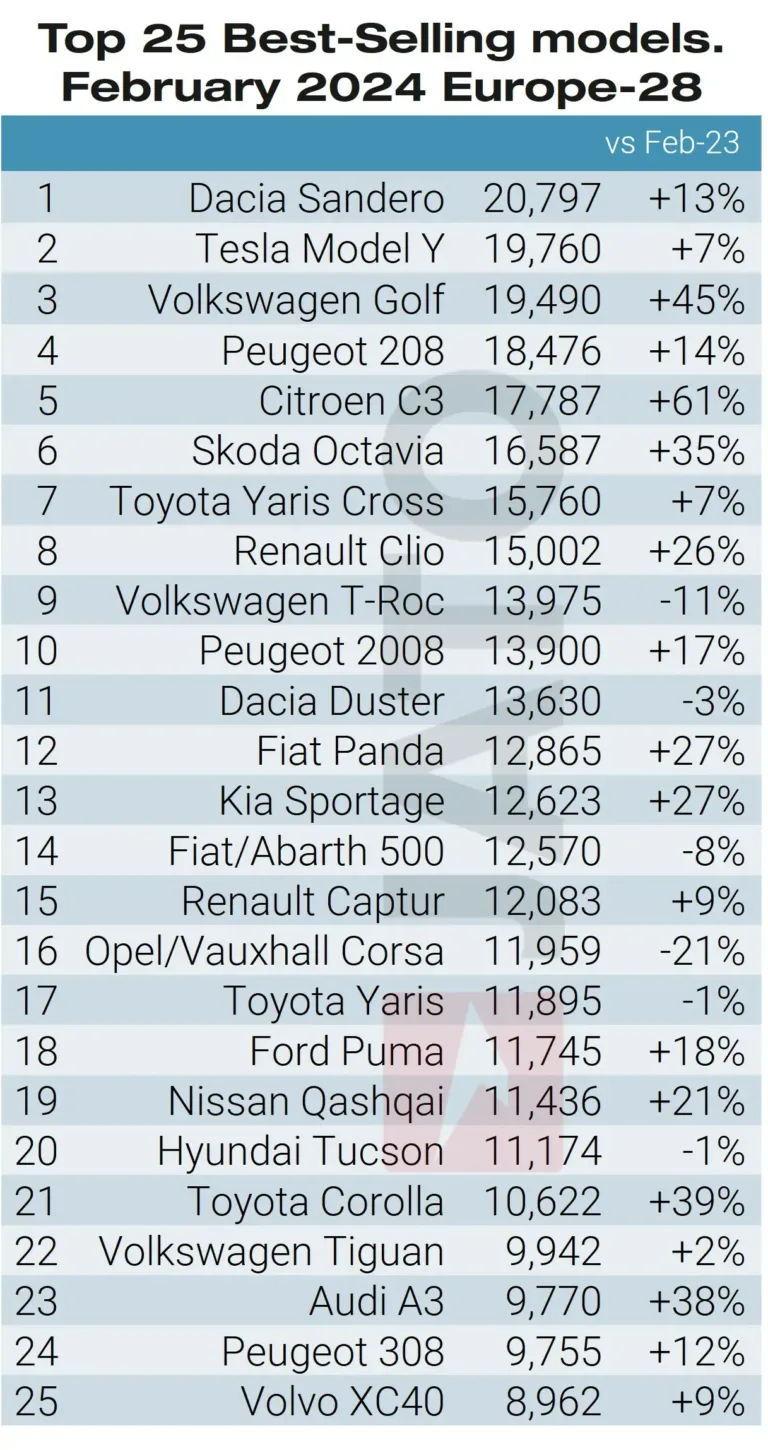
The Dacia Sandero retained its position as the most registered car in Europe for the second month in a row, with 20,800 units registered – an increase of 13% compared to February 2023. The Tesla Model Y fell behind, having been the most registered passenger car in Europe last year while strong demand in key markets saw the Volkswagen Golf take third place.
Year-to-date 2024, the Dacia Sandero was the top-selling car model in Europe in 2024 followed by the VW Golf and Peugeot 208.
Registrations of Citroen’s C3 increased by 61% from February 2023, in part due to the competitive deals offered on the previous generation and prices introduced by the OEM as the new generation arrived. The Skoda Octavia, Toyota Corolla, Audi A3, BMW X1, Seat/Cupra Leon, Tesla Model 3, MG Zs, and Opel/Vauxhall Astra also saw a rise in registrations.
Among the latest entries, Jeep registered 5,677 units of the Avenger, 1,434 of which were electric. Volvo registered 3,663 units of the EX30, and Renault registered 1,722 units of the Espace. Mitsubishi registered 1,535 and 1,339 units of the Colt and the ASX, respectively, and Honda registered 1,100 units of the ZR-V.
Europe’s Favorite Electric Car Models in February 2024
Europe’s favorite battery-electric and plug-in hybrid car models in February 2024 according to JATO were:
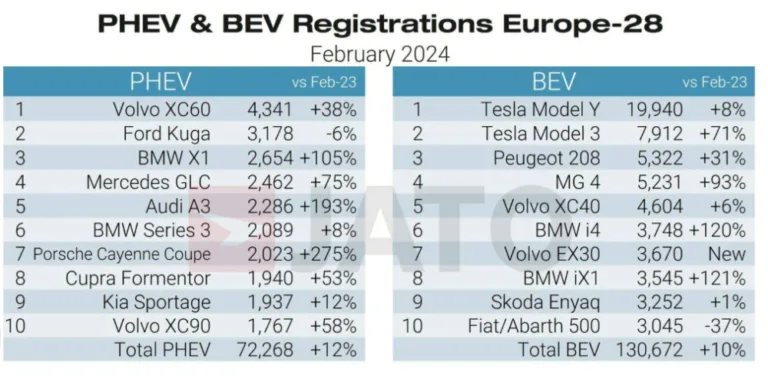
The Telsa Model Y and Model 3 remained by far the most popular electric car models in Europe in February and year-to-date 2024. Volkswagen had dismal electric car sales in February 2024 with only around 2,500 cars sold of each of the VW ID3 and ID4 models. Production resources were shifted to petrol models with the Golf performing particularly well.
Europe Car Sales Statistics
→ Latest European Car Sales Statistics
- 2025 (Outlook) Europe: Car and Electric Car Sales Forecasts
- 2024 (Full Year): Market Analysis, Car Sales by Country, Electric Sales by Country, Best-Selling Brands, Top 50 Models, Top 20 Electric Models
- 2024: January, February, March, April, May, June, July, August, September, October, November
- 2024 (Half Year): Car Sales by European Country, Top Brands, Top 25 Models
- Full-Year 2023: Car Sales by Country, Brands, Top 50 Models, Top 20 Electric Car Models
